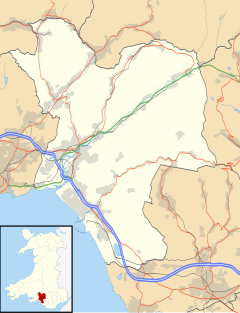Seven Sisters, Wales
Seven Sisters
|
|
|---|---|
| Seven Sisters shown within Neath Port Talbot | |
| Population | 2,123 (2011) |
| OS grid reference | SN820088 |
| Principal area | |
| Ceremonial county | |
| Country | Wales |
| Sovereign state | United Kingdom |
| Post town | NEATH |
| Postcode district | SA10 |
| Dialling code | 01639 |
| Police | South Wales |
| Fire | Mid and West Wales |
| Ambulance | Welsh |
| EU Parliament | Wales |
| UK Parliament | |
| Welsh Assembly | |
Seven Sisters (Welsh: Blaendulais: source of the (river) Dulais) is a village in the Dulais Valley, Wales, UK. It lies 10 miles (16 km) north-east of Neath. Seven Sisters falls within the Seven Sisters ward of Neath Port Talbot county borough.
The village of Seven Sisters had always been recognised historically for its coal mining pit that was located in the middle of what was once one of the richest sources of coal in Britain, if not the world, in the heart of the South Wales Coalfield.
Development of many mines, and hence small settlements into villages and towns in the area, was brought about by a combination of a rich deposits of anthracite in the western South Wales coalfield, as well as the construction of the Neath and Brecon Railway from 1862.
David Evans of the Evans-Bevan coal mining partnership, had wanted to call the colliery after his daughter, Isabella Bevan who cut the first sod on the land at Bryn Dulais farm with a silver spade on Monday, March 11, 1872. However, in light of superstition, and the fact that his own six sisters attended the ceremony, Evans agreed to call the mine Seven Sisters.
Anthracite coal fields always suffer from blow out, and on 10 November 1907, one occurred which killed 5 men. In 1923, there were 607 men working at Seven Sisters, producing from the Furnace Four Feet, Brass and Nine Feet Big Vein seams. During World War II the colliery was featured in an anti-Nazi film The Silent Village, made with the cooperation of the South Wales Miners Federation.
During the 1950s geological problems and changing economic conditions took their toll, and in May 1963 the colliery closed and the pit filled in. The men who had been employed at the Seven Sisters were transferred to the nearby Blaenant Colliery, which closed in 1990.
...
Wikipedia

